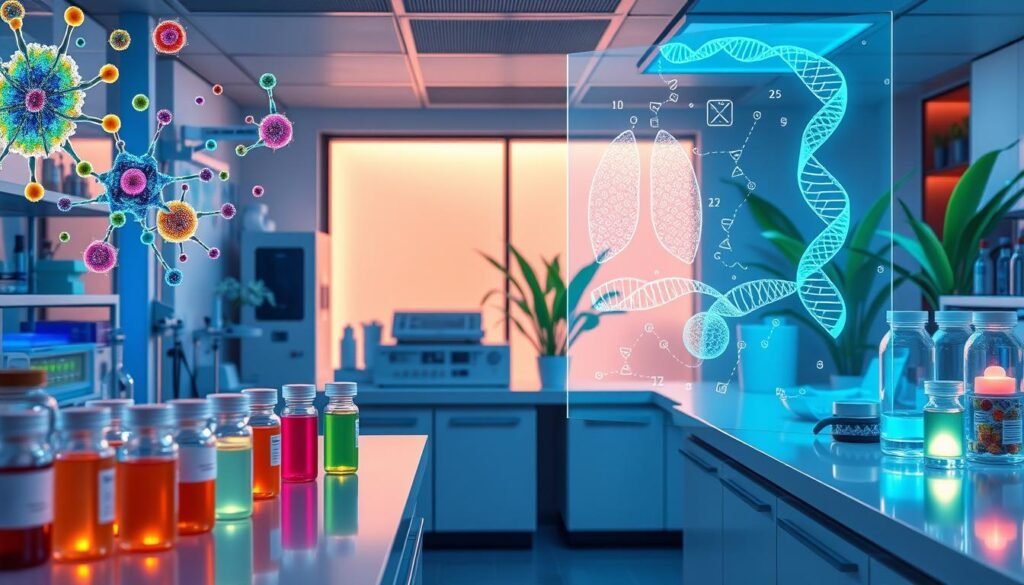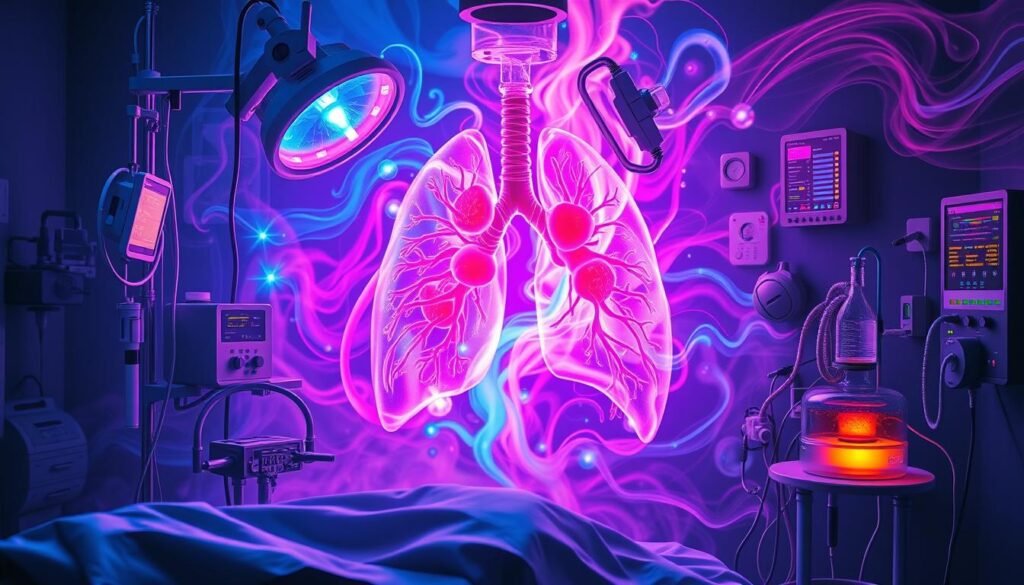Lung cancer ranks as the second most common cancer among both sexes. In the United States, experts expect around 238,340 new cases in 2023. This high number highlights the importance of finding effective treatments. Chemotherapy is key in fighting lung cancer, often used with surgery or radiation. Yet, it’s vital to know the good and bad sides, including side effects. This article looks deep into chemotherapy’s role in lung cancer treatment. It offers a balanced view of its benefits and drawbacks.
Key Takeaways
- Lung cancer is one of the most common cancers in the U.S., highlighting the need for effective treatments.
- Chemotherapy is a vital component in lung cancer treatment options.
- Understanding the chemotherapy side effects is crucial for managing patient care.
- Benefits of chemotherapy must be weighed against its potential risks.
- The combined approach of treatment often leads to better outcomes.
Understanding Lung Cancer
Lung cancer is a major health challenge, divided into two kinds: non-small cell lung cancer and small cell lung cancer. The former makes up about 80-85% of cases. It is often found at advanced stages, which complicates treatment. Small cell lung cancer, on the other hand, grows quickly and spreads early.
The Centers for Disease Control and Prevention report high lung cancer rates, especially in older people. Smoking is a big risk factor, responsible for 85% of cases. Exposure to asbestos and radon also increases risk.
Lung cancer starts from changes in lung cells that cause uncontrolled growth. It can spread to nearby areas and other parts of the body. For those with lung cancer, knowing the differences between its types is important for treatment.
Understanding the types, risks, and biology of lung cancer helps patients and doctors fight it effectively.
What is Chemotherapy?
Chemotherapy is a way to fight cancer with drugs called anticancer drugs. It attacks fast-growing cancer cells. The main aim is to kill these cells or stop their growth, helping with cancers like lung cancer.
There are different chemotherapy drugs, each working in its way. They spread in the blood, reaching cancer cells all over the body. Chemotherapy can be given as pills or through injections.
Patients talk with healthcare providers about what to expect and the risks. Knowing about anticancer drugs helps patients choose their treatment. Sources like the American Society of Clinical Oncology give advice on managing cancer.
For more info on chemotherapy, Cancer Research UK has lots of insights on treatment and patient care.
The Role of Chemotherapy in Lung Cancer Treatment
Chemotherapy is key in treating lung cancer. It acts as the main treatment and helps after surgery. It also eases symptoms in late-stage patients. Each role boosts the success of lung cancer therapies.
As the main treatment, chemotherapy attacks cancer cells to shrink tumors. It may increase survival in some lung cancer types. Chemotherapy also helps surgery work better and prevent the cancer from returning.
In advanced lung cancer, chemotherapy aims to make patients more comfortable. It reduces symptoms and the impact of the disease. This improves patients’ quality of life significantly.
Chemotherapy is vital in lung cancer care for many reasons. Research is making it even better, offering hope for better patient outcomes.
Chemotherapy in Lung Cancer Treatment: Pros and Benefits
Chemotherapy plays a big role in lung cancer treatment. It can fight many types of lung cancer well. Knowing how effective it is helps patients and doctors create good treatment plans.
Effectiveness against Various Lung Cancer Types
Chemotherapy works differently on each lung cancer type. Non-small cell lung cancer, or NSCLC, often shrinks a lot with certain chemo drugs. Small cell lung cancer, known as SCLC, also responds well to chemo, improving symptoms quickly for many. Each patient gets a plan made just for their type of cancer. This ensures they get the best possible treatment.
Combination with Other Treatment Options
Adding other treatments to chemotherapy can work better against cancer. For example, using chemo with radiation therapy can be very effective. It can reduce tumors more and help avoid resistance. Also, chemotherapy with immunotherapy can really boost the attack on cancer cells.
Many doctors suggest using more than one treatment. This combo often helps patients live longer and have a better life.
https://www.youtube.com/watch?v=hAvy3tIdGEY
| Cancer Type | Chemotherapy Response | Common Treatment Combinations |
|---|---|---|
| Non-small cell lung cancer (NSCLC) | High | Chemotherapy + Radiation |
| Small cell lung cancer (SCLC) | Very High | Chemotherapy + Immunotherapy |
| Stage IV Lung Cancer | Variable | Chemotherapy + Targeted Therapy |
Examining the Cons of Chemotherapy
Chemotherapy is often used to treat lung cancer. However, it has drawbacks that need attention. One major issue is chemotherapy resistance. This makes treatment less effective and adds to lung cancer challenges.
Potential for Chemotherapy Resistance in Lung Cancer
Studies show some lung cancer cells may grow resistant to chemotherapy. This resistance is a major hurdle in treating lung cancer. As cancer advances, drugs work less effectively, leading to poor treatment results. Figuring out why resistance happens is key for future therapies.
Several factors can cause chemotherapy resistance. These include:
- Genetic mutations in the cancer cells
- Changes in how drugs are absorbed
- Differences in how cancer cells process substances
Patients and doctors must understand chemotherapy’s risks go beyond just side effects. Ongoing research aims to find ways to make chemotherapy work better. The goal is to beat these lung cancer obstacles.
Common Chemotherapy Side Effects
Chemotherapy is key in treating lung cancer. But we must also talk about its side effects. Knowing these helps patients and caregivers get ready, leading to a better life during treatment.
Physical Side Effects
People getting chemotherapy might face different physical side effects. These vary by person and treatment plan. You might see:
- Nausea and vomiting
- Fatigue that can affect daily activities
- Hair loss in varying degrees
- Changes in appetite and weight changes
- Mouth sores and other stomach issues
These effects can make daily life hard for patients. They try to keep things normal while on their treatment path.
Mental Health Impacts
Chemotherapy doesn’t just affect the body; it hits mental health too. Many deal with mental challenges during treatment. It’s key to spot these to care fully. You might face:
- Anxiety about treatment results
- Depression from the sickness and its demands
- Cognitive changes affecting memory and focus
Helping with these mental effects helps with overall health and treatment success. Groups and counseling can really help those feeling these impacts.

| Type of Side Effect | Examples |
|---|---|
| Physical Side Effects | Nausea, Fatigue, Hair Loss |
| Mental Health Impacts | Anxiety, Depression, Cognitive Changes |
Targeted Chemotherapy for Lung Cancer
Targeted chemotherapy for lung cancer is a big step forward in oncology. It comes with the growth of precision medicine. This approach uses therapies aimed at genetic mutations in cancer cells. Thus, it stops tumor growth and improves outcomes for patients.
These therapies attack specific parts of cells that help cancer grow. For instance, angiogenesis inhibitors like bevacizumab and ramucirumab stop tumors from making new blood vessels. KRAS inhibitors, such as sotorasib and adagrasib, attack lung cancer mutations. Other types include EGFR inhibitors like afatinib and osimertinib, and ALK inhibitors such as lorlatinib and alectinib.
Clinical trials show these therapies work well. Patients often have fewer side effects than with traditional chemotherapy. This leads to a better life during treatment. Plus, these therapies can enhance the effects of standard chemotherapy.
Genetic testing helps customize therapy to each tumor’s profile. This is key to precision medicine. Knowing a patient’s genetic markers lets doctors pick the best therapies.
New targeted therapies are being developed. It’s vital for patients and doctors to keep up with these advances. For detailed information on lung cancer treatments, visit cancer.org.
Personalized Chemotherapy for Lung Cancer Patients
Personalized chemotherapy is becoming popular for lung cancer. It looks closely at each patient’s cancer characteristics. Genetic testing helps choose the right treatments. This can make therapy more effective and lessen bad side effects.
Role of Genetic Testing
Genetic testing is key in personalized chemotherapy. It examines the genetic make-up of a patient’s tumor. Doctors use this data to pick the best treatments. This leads to targeted treatments that work better than old methods.
Benefits of Personalized Treatment Plans
Personalized chemotherapy brings many benefits:
- Increased Efficacy: Treatments based on genetics can have better results.
- Reduced Side Effects: Custom treatments mean fewer harmful effects, making life better for patients.
- Optimized Dosing: Personalized plans help in choosing the right dose for the best results.
This approach to therapy gives lung cancer patients care that fits their unique needs. It makes their treatment journey more effective.

Understanding Chemotherapy Regimens for Lung Cancer
Chemotherapy for lung cancer uses drugs to target cancer cells. The treatment depends on the cancer type and stage. It also looks at patient factors. Drugs like cisplatin, carboplatin, and pemetrexed are key in these treatments.
Treatment schedules impact outcomes. They usually repeat in cycles. A cycle might be three weeks, with one week on treatment and two off. This cycle helps the body recover and keeps fighting cancer.
Following your chemotherapy plan is key to its success. Completing all doses gives you the best chance. It’s important to see your doctor regularly. They can track your progress and manage any side effects.
Advanced Lung Cancer and Chemotherapy Options
Advanced lung cancer introduces unique challenges, necessitating a deep dive into chemotherapy options. This treatment is key, offering help even when the disease advances. It aims to ease symptoms, significantly improving life quality.
For those at advanced stages, there are several treatments to consider. Chemotherapy might be the main approach or used with other therapies. Inclusion of palliative care is also vital. It helps ease symptoms and stress, benefiting patients and their families.
Choosing the right treatment path is crucial for patients in advanced stages. They might get a mix of drugs, depending on their needs. Some drugs used include:
| Chemotherapy Agent | Mechanism of Action | Common Side Effects |
|---|---|---|
| Cisplatin | DNA cross-linking agent | Nausea, fatigue, nephrotoxicity |
| Carboplatin | Similar to Cisplatin but with a different toxicity profile | Bone marrow suppression, nausea |
| Pemetrexed | Antifolate that interferes with DNA synthesis | Fatigue, rash, nausea |
Handling advanced lung cancer demands a comprehensive strategy. Adding palliative care matches treatment with patient goals, focusing on comfort. Discussing options encourages teamwork between patients and doctors, leading to better care choices.

Conclusion
A look at chemotherapy in lung cancer treatment shows both its benefits and challenges. This article taught readers about how well chemotherapy works against different types of lung cancer. It also covered the side effects and the new era of personalized therapies.
As treatments get better, it’s key for both patients and caregivers to know what options they have.
The article wrapped up by underlining the value of ongoing research. It talked about novel strategies, like creating new drug delivery systems. These and maintenance therapy options could help improve patient outcomes.
Having conversations with doctors is crucial to understand these advancements. It also helps in creating treatment plans that meet individual needs.
Dealing with lung cancer can seem overwhelming, but having the right information can make a big difference. For those looking for more depth, there’s a detailed study on chemotherapy in lung cancer. This knowledge is key to making informed decisions about treatment and improving care quality.